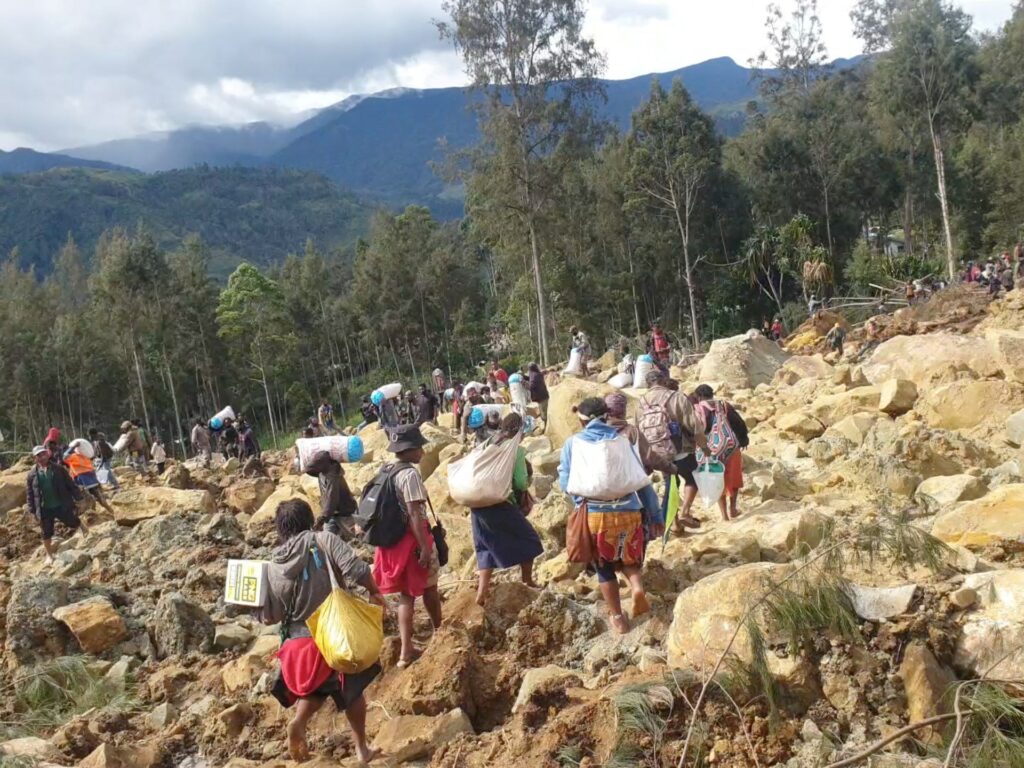The death toll from a massive landslide in Papua New Guinea (PNG) has been revised to more than 670 by the International Organization for Migration. The landslide buried more than 150 homes in Yambali village and Enga province, leading to this tragic toll.
Initially, the death toll was estimated at 60 homes, but it has now risen significantly. Serhan Aktoprak, the chief of the United Nations agency’s mission in PNG, described the situation as terrible, with the land still sliding and water creating a massive risk for everyone involved.
Emergency responders are working to move survivors to safer ground as tonnes of unstable earth continue to pose a threat. Tribal warfare in the country’s highlands and damaged infrastructure are further complicating rescue and relief efforts.
Heavy earth-moving equipment has yet to arrive at the mountainous location, where the landslide, consisting of car-sized boulders and uprooted trees, is up to 8 meters deep in some areas. The catastrophe has devastated the village’s livestock, food gardens, and water sources.
Authorities are attempting to establish evacuation centers on safer ground on both sides of the debris field, which covers an area equivalent to three to four football fields. The situation remains unstable, and the government is considering requesting additional international assistance.
The United States and Australia have expressed readiness to provide aid, as PNG soldiers provide security for relief convoys facing risks related to tribal conflicts. The government is expected to make a decision on requesting further international assistance by Tuesday.
#estimates #killed #Papua #Guinea #landslide
Long-term Implications and Future Developments
The massive landslide in Papua New Guinea (PNG) has brought about devastating consequences, with the death toll now estimated to be more than 670. This tragic event has not only resulted in loss of lives but has also wiped out entire villages, including livestock, food gardens, and sources of clean water. The long-term implications of this disaster are significant and will require sustained efforts for recovery and rebuilding.
Environmental Impact
The environmental impact of the landslide is profound, with the landscape drastically altered by the tons of unstable earth and debris. The destruction of natural habitats, including uprooted trees and disrupted ecosystems, will have lasting effects on the local flora and fauna. Efforts will be needed to restore the ecological balance and prevent further environmental degradation in the region.
Humanitarian Crisis
The humanitarian crisis caused by the landslide is ongoing, with survivors in need of immediate assistance, including shelter, food, and medical care. The displacement of communities and the loss of essential services have created a vulnerable population that requires sustained support to rebuild their lives. Addressing the long-term needs of the affected individuals will be crucial in the recovery process.
Infrastructure Damage
The damage to infrastructure, including roads and communication networks, has hampered rescue and relief efforts in the affected area. Rebuilding essential infrastructure will be essential for facilitating access to remote locations and ensuring the efficient delivery of aid. Investment in resilient infrastructure will also be necessary to mitigate the impact of future disasters.
Future Developments
Looking ahead, the focus will be on establishing evacuation centers on safer ground, providing ongoing support to survivors, and initiating long-term recovery and rebuilding efforts. Coordination among government agencies, international organizations, and local communities will be essential in addressing the complex challenges posed by the landslide and its aftermath.
Actionable Advice
Based on these insights, it is crucial to prioritize the following actions:
- Ensure timely and coordinated response efforts to address immediate humanitarian needs.
- Invest in sustainable infrastructure development to enhance resilience to future disasters.
- Engage local communities in the recovery process to ensure their needs and voices are heard.
- Mobilize international support and resources to supplement domestic efforts and facilitate long-term recovery.
By taking proactive measures and working together collaboratively, we can support the affected communities in Papua New Guinea and build a more resilient future in the face of natural disasters.
Source: Al Jazeera and news agencies

